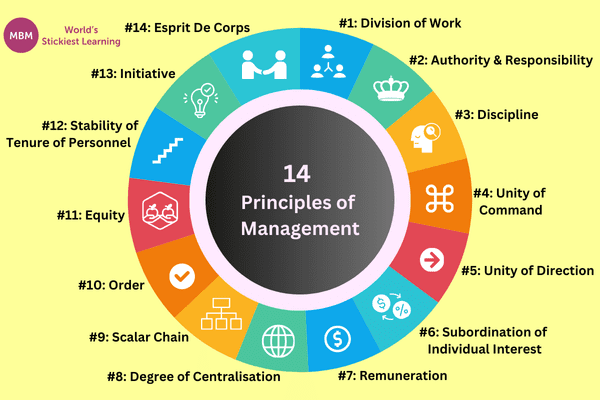A Century on, Henri Fayol’s WW1 Era Management Theory Still Delivers Results
The Principles of Management that Henri Fayol identified over a century ago regarding dividing up work and controlling it, are still accepted business wisdom. Fayol, a French mining engineer turned company manager, set out his management principles in his 1916 book “Administration Industrielle et Generale,” or in English, “Industrial and General Management,” which you can still buy. Fayol’s management theory is general enough to apply to all kinds of industries, at all levels. Here’s why you need to know about it.

Being a Brilliant Specialist Doesn’t Automatically Make You a Good Manager! You Must Also Understand the Principles of Management
In Fayol’s time, the same as now, businesses promoted people who did well in their specialist area. But here’s the thing. Being great at developing IT, sales, account handling or whatever doesn’t necessarily make you a good manager. You also need to know about management.
People refer to Fayol rather grandly as the Father of Modern Management. However, saying that, he wasn’t an academic theorising in an ivory tower, he worked out his ideas at the sharp end. In his book he wrote that when he took responsibility for restoring the fortunes of the mining company where he’d spent his career, he couldn’t rely on his technical superiority, but on his ability and skill in handling people. So, Fayol worked out what to do, and passed his insights on to us.
Business cultures are very different from Fayol’s time. Saying that, the principles he identified in his book are still as relevant, and you can learn about them in classes and on courses, and get a taster here.
So, in this article, we look at:
- What are Henri Fayol’s 14 Principles of Management?
- What are the 5 functions of management?
- Division of work: the core Principle of Management
- Why are the 14 Principles of Management important?
- Examples of the 14 Principles in action
- Why do you need to study the Principles of Management?
- What are the objectives of a Principles of Management class?
- What can I expect from a Principles of Management class?
- What further resources are there?
So, let’s look at the first of these.
What Are Henri Fayol’s 14 Principles of Management?
In his book “Administration Industrielle et Generale,” Henri Fayol identified the following 14 principles:

Explaining Henri Fayol’s 14 Principles of Management
Over the past century, Henri Fayol’s book and his 14 Principles of Management have become widely recognised. Some people refer to Fayol’s ideas as ‘Administrative Theory.’ It’s clear from the above list that the 14 Principles focus on administration and people skills, rather than technical expertise. So let’s look at them in more detail:
Sticky Learning ® is 7 times more effective than 1-day training courses. Plus, you will get a Chain of Evidence proving your Return on Investment. Discover soft skills training that changes behaviours long term.

#1: Division of Work:
Separating work into functions with different skills enhances the quality of output, and improves productivity. Dividing it like this improves efficiency, accuracy and speed. His principle applies as much to management functions like accounting or HR, operational ones like manufacturing, or ‘tech’ ones like IT.
#2: Authority and Responsibility:
In Fayol’s principles of management, these are the two key elements of management. Authority enables managers to be effective in getting their subordinates to do the work. Responsibility makes them answerable for the work their team does.
#3: Discipline:
Now this is essential in any operation or project, and you can’t achieve anything without it. People doing the work willingly and well and interacting respectfully, make the manager’s job easier. Orderly and agreeable behaviour also means team members will do well and progress.
#4: Unity of Command:
In Fayol’s principles of management, an employee should only be answerable to one boss, and follow their command. If they report to more than one person, this can create conflicts of interest and confusion. That doesn’t rule out people dividing their time between their main role and working on projects, or working on several clients’ businesses, as happens in marketing services agencies. However, the point still stands – there needs to be one boss in each activity.
#5: Unity of Direction:
Everyone involved in the same activity should have a unified goal and a team plan, which the manager is responsible for.
#6: Subordination of Individual Interest:
Employees should work towards the company’s interest, rather than their personal gain, and put the company before themselves. This applies to everyone in the hierarchy, including the senior managers.
#7: Remuneration:
Motivation and productivity are closely linked, and remuneration is important in motivating employees. It can take both monetary and other forms, such as incentives. Ideally, employers should reward individual effort and achievement. However, some jobs don’t lend themselves easily to target-setting. So, incentivising some people may seem unfair to others who put in just as much effort.
#8: Degree of Centralisation:
In Fayol’s thinking, it’s important to get the balance right between centralised decision-making, from the top, and letting individual managers and, where appropriate, individual employees make decisions.
#9: Scalar Chain:
Every employee must know their place in the hierarchy and who to speak to in the chain of command. Hence, in his book, Fayol suggested organisation charts as a way for employees to see the company structure clearly.
#10: Order:
A well-defined ‘social order’ in the workplace fosters a healthy work culture. All in all, a positive workplace atmosphere will boost productivity.
#11: Equity:
Fayol wrote in “Administration Industrielle et Generale” that managers should show all employees “a combination of kindness and justice.” Hence it’s down to managers to treat everyone equally and respectfully and ensure team members aren’t discriminated against.
#12: Stability of Tenure of Personnel:
Minimising staff turnover and job changes maximise efficiency because people’s performance improves over time. Also, employees do their best work if they feel secure. So, it’s the manager’s job to offer them job security.
#13: Initiative:
Managers should support and encourage employees to take initiative, as it increases motivation and boosts morale.
#14: Esprit de Corps:
All right, so you probably don’t hear the term “esprit de corps” much these days. In plain English, it means team spirit. Team spirit, unity and morale are priceless. It’s management’s responsibility to motivate employees and support them, and it pays dividends. Developing trust and mutual understanding leads to better outcomes and a positive work environment.
What Are the 5 Functions of Management?

Okay, if you’re new to this, Fayol’s 14 Principles can be a lot to take in. They become clearer if you understand how they fit into the 5 Functions of Management, which Fayol also identified in his book:
#1: Planning:
Assessing the business’s goals, now and in the future, and what you need to achieve them, in terms of people and other resources.
#2: Organising:
Allocating work, and having clear lines of authority and responsibility.
#3: Commanding:
Not just ordering people about, but knowing their skills and tapping into them, and showing leadership.
#4: Coordinating:
Making sure individual functions in the business know what the others are doing, and what you expect of them.
#5: Controlling:
Checking that everything is working as it should, is very different from micromanaging. Saying that, this level of control may sometimes be necessary – for instance, to get things back on track, or when you’re doing something new, or making a change.
Why is Division of Work the Core Principle of Management?
As we saw earlier, division of work is Principle #1 of the 14 in Fayol’s list. This covers three of the 5 Functions of Management he identified: Organising, commanding, and coordinating.
Dividing work into smaller, specific tasks means:
- Different people or groups can carry out multiple processes simultaneously, speeding up production.
- People develop specialist skills, increasing efficiency.
- Dedicated teams produce more and better work for the same effort.
Why Are the 14 Principles of Management Important?
Fayol’s Principles identified the skills managers need to do their job well. They foster efficient use of available resources and promote effective leadership. Besides inspiring much of today’s management thinking, they offer helpful hacks for any business.
What Are Some Examples of the 14 Principles of Management?

It’s easier to understand these if you take a real-life scenario, like an owner-managed confectionery manufacturer.
#1: Division of Labour:
The company has different operating departments, which report to the management team. These are accounts, HR, product development, production, marketing, sales, and distribution. However, one of the owner directors is personally responsible for developing the company’s traceability systems.
#2: Authority and Responsibility:
In the sales department, the sales director has overall responsibility for the sales effort. The key accounts and national account managers look after the major customers, the national sales manager is responsible for overall field sales to other customers, and the regional sales managers (RSMs) oversee the field sales reps.
In a day-to-day example, the marketing manager has booked a stand at a trade show, in conjunction with asking the regional sales manager to arrange for some members of the sales team to represent the company. The reps are each responsible for acting on the request and turning up on time.
#3: Discipline:
One of the reps arrives late and isn’t wearing appropriate clothing. They are not complying with this principle and can expect to be told off.
#4: Unity of Command:
The rep ultimately answers to the Sales Director, rather than the Marketing Manager, so any immediate disciplinary action will come from the most senior member of the sales team at the show.
#5: Unity of Direction:
The Marketing and Sales Divisions work closely together, so the marketing manager and the relevant key account manager both talk to major customers who come on the stand.
#6: Subordination of Individual Interest:
The members of the marketing and sales departments know they must check before booking holidays, in case they clash with trade shows or other events where they should be present.
#7: Remuneration:
According to Fayol, the salary paid to staff must be equitable, fair, and guaranteed. The company pays the same starting salary to all the field sales reps, regardless of age or gender.
#8: Degree of Centralisation:
The owner-directors set the goals with the different department heads and sign off on each department’s plans for the year. However, the development and implementation of individual department’s plans is down to the departments. Each department reports to the owner-directors.
#9: Scalar Chain:
The owner-directors like to be on first-name terms with every employee and issue an updated ‘organogram’ every time a new team member joins.
#10: Order:
The owner-directors uphold Fayol’s principle of order. This suggests there should be “a fixed order for everything, and everyone in their place.” It may sound rather rigid and authoritarian for a small company. However, knowing for certain who is responsible for what ensures the business works properly, and enables the company to grow.
#11: Equity:
To ensure loyalty, it’s important to treat all employees fairly, in a friendly fashion, without favouritism, and with equality of opportunity. The business owners do their best to foster a family atmosphere but are mindful that employees may feel their prospects are limited because they aren’t part of the family.
#12: Stability of Tenure of Personnel:
Fayol says minimising staff turnover and job changes will maximise efficiency. So, the confectionery company rewards employees when they reach a milestone – three years, five years, ten years. Over half the employees have been with the company since it began.
#13: Initiative:
The company encourages employees at all levels to put forward suggestions for improvements and where appropriate, involves them in putting them into practice.
#14: Esprit De Corps:
Team building and morale are at the heart of the confectionery company’s ethos. So in our example, the business owners actively encourage their managers and their teams to get involved in volunteering, community projects and charity fundraising, which brings the team together.
Why Do You Need to Study All This?
So, we’ve looked at the Principles of Management and how a real-life business applies them. All in all, studying these Principles in more detail is important in helping managers:
- Achieve the business’s goals effectively and efficiently.
- Take the right decisions at the right time, and anticipate problems and tackle them appropriately.
- Think beyond the task in hand and fulfil their commitment to employees and stakeholders.
What is a Principles of Management Class?

A principles of management class is designed to expose people to a variety of concepts within the framework of managing a business. Furthermore, students learn how to think as managers and actively run businesses and teams, using effective practices covering the following areas:
- Planning
- Decision making
- Organisational structure
- Business culture
- Leadership Motivation
- Communication
What Are the Objectives of a Principles of Management Class?
- Examine Fayol’s management functions of planning, organising, commanding, coordinating and controlling, and its impact on the business.
- Discuss the necessary skills and functions required to be an effective manager in today’s business environment.
What Can I Expect From a Principles of Management Class?
All in all, you should expect the following learning outcomes:
- Explore the role of management and strategic planning principles.
- Assess how businesses are designed to achieve strategic objectives.
- Analyse the nature and importance of leadership in businesses.
- Identify how businesses monitor and adjust their plans.
And Finally: What Further Resources Are There?

Okay, so now you’ve read this far, you should have a fair idea of Henri Fayol’s Principles of Management and his contribution to management theory. But to go deeper, you can find a 2016 digital version of his book ‘General and Industrial Management’ at Google Books. Also, there are plenty of downloadable resources available online, on the principles of management.
So, if You’ve Enjoyed This Article, Why Not Broaden Your Management Vision With Our Soft Skills and Management Training Courses?
Making Business Matter is the soft skills training provider to many leading manufacturing and retailing companies, partnering with them to increase their sales and profits. We have designed our courses to help solve specific problems that these businesses face. Moreover, they are all delivered by world-class tutors, who have worked in the industry. So, to find out more, visit our Soft Skills Training Courses & Management Training page.

We look forward to helping you bring Henri Fayol’s 14 Principles to life in your business!




